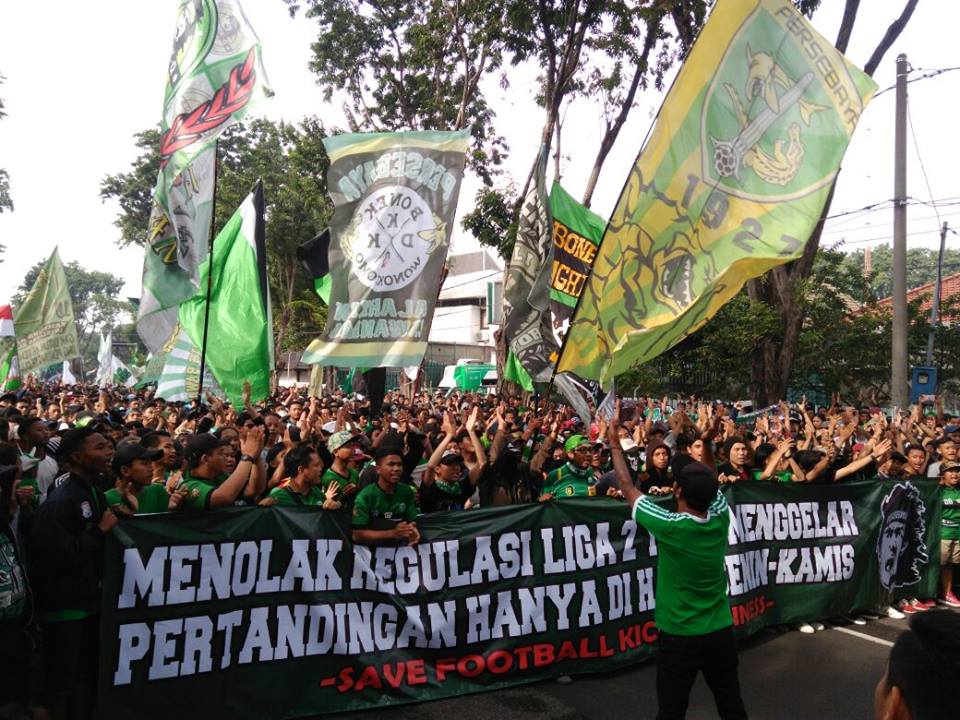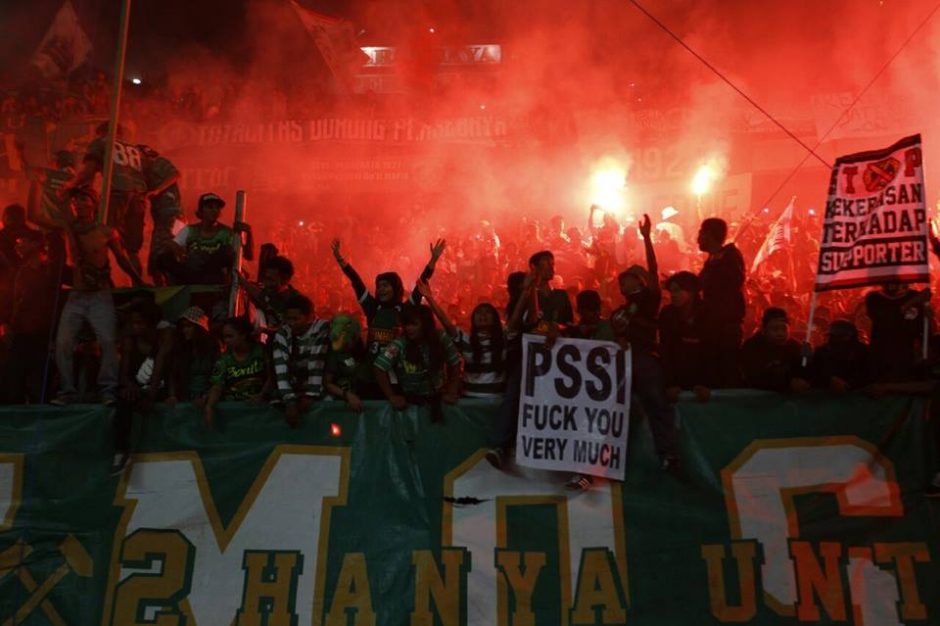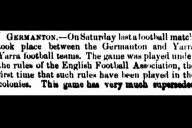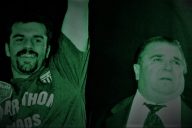Andie Peci of the Bonek: The hard life and dangerous times of an Indonesian football ultra
The re-launch of the Go-jek Traveloka Indonesian Football League saw the return of Persebaya from several years in non-playing wilderness. This was a struggle played out on the increasingly orderly streets of the port city of Surabaya, and of course through social media campaigns, where fans strengthened their attacks and resolve against the PSSI (Persatuan Sepakbola Seluruh Indonesia, aka Indonesian Football Federation). The reinstatement of Persebaya brought back a degree of history and footballing culture that would have been otherwise missing from the Second Division. Persebaya remains as the nation’s most iconic club, despite its troubled recent history.
Warkop Pitulikur is a modest, open-air café on the side of a busy, dusty road in central Surabaya. It is open 24 hours a day, and is the meeting point for Surabaya’s tens of thousands of Persebaya fans. The owner of the café, Cak Cong provides freshly ground coffee – with beans from throughout Indonesia – and most customers drink their coffee while eating fried food with fresh chili. It was my second day back in Surabaya, and, not having much time to lose, I was confident that through just by showing up in the early evening, at Warkop Pitulikur, I would more than likely be able to find myself a football fan who could provide an insight into what was going on with the Bonek and the Club. ‘Bonek’ is the term that refers to the masses of supporters of Persebaya, a club founded in 1927, in Surabaya.
Football fandom is contested. Intense rivalries not only exist between supporters of different teams, but amongst supporters of the same team. The ultra-supporters of clubs often exist in a state of constant agitation with their club’s owners. Although Persebaya is privately owned by the Jawa Pos media group, the Bonek supporters can claim ‘ownership’ of the club through their long-standing activism in shaping the club’s culture and stadium atmosphere. Websites such as the newly-re-launched Green Nord 27 and Emosi Jiwaku, and countless twitter accounts, are testimony to the fans’ work in promoting and exploring the club’s trajectory.
Tensions between fans revolve around loyalty to the Club, and methods of how loyalty is expressed. Being a fan of the same football club provides an expression of unity amongst fans of disparate social backgrounds. It’s a fragile and vulnerable imagined community. The unity of Persebaya’s fans, who are perhaps the greatest in number of any Indonesian club, are remarkable for not only their degree of emotional investment, but, also for their unity. Throughout their team’s period of exile the Bonek fought unfailingly against the national (PSSI) and global (FIFA) football bureaucracies. This campaign was led by Andie Peci.
Very few fans carry scars as evidence of their dedication and support for not only their Club, but, also for their fellow-supporters. Andie Peci, activist and spokesman and representative of the legendary Bonek of Surabaya, carries a large scar on his left elbow where he was attacked with a knife for standing up to the football mafia and militias which are implicated in Indonesian football.
Andie has a slight frame, but a steely gaze: he doesn’t suffer fools easily and sees the trajectory of the Club in the long-term. Winning and losing matters for him no doubt, but it is the survival of the Club and the ethics of its supporter group, the Bonek, which matters more. Peci resists any formal recognition of a title or leadership, asserting the egalitarian ethos of both the city and the Bonek themselves. Yet, Peci, is the Bonek who is most easily identified with the resistance to the PSSI and the corruption of the national leagues.
***
I wasn’t born here in Surabaya. I grew up in Madiun, a small city near the border of East and Central Java. Many Bonek are also like this. I only came here when I was 18 years old, after finishing high school. Although, I had been a long-time fan of Persebaya, I only became an activist for Persebaya/Bonek when the club was no longer recognised by the PSSI. Although this happened in 2010, we already had long-standing grievances with the PSSI. As is widely known Bonek have long had a bad reputation. This reputation has not always been justified, but it is a reputation that has stuck.
The term ‘Bonek’ comes from ‘bondo nekat’: ‘bermodal nekat’, which can roughly be translated ‘having nothing but guts’. Bonek, in the past, are known to have travelled for ‘away days’ with no money for food or accommodation or carrying tickets. So, they would hitch rides, ransack street stalls and get into the stadium by climbing over fences. Many of the Bonek are poor and unemployed, yet give their all for their support of the team; they’ll do anything to watch their team play. And, they were the first group of supporters in Indonesia to engage in long-distance travelling to watch their team.
There is a culture shift happening within the Bonek now, as a result of being back in the competition. Both management and us supporters realise that the Club has to be financially stable; we have to make the Club relevant to a broad section of Surabaya. We’re engaging in sustained campaigns of ‘Persebaya-ing Surabaya’. For example, we recently held a meet-and-greet of the players at a mall; where we also had a ‘chant class’. The commercial viability of the club is okay, provided that the identity of the club remains the same. Jawa Pos, a media consortium, knows that if it upsets us, they’ll quickly lose a lot of business and the trust.
I was the victim of violence on several occasions throughout the struggle to re-instate the club. I was attacked with a knife several times and I have several large scars over my body (on my back and elbow). When this happened, politicians under-estimated the spirit of Bonek. Rather than diminishing the appetite for resistance and willingness to fight the PSSI, our resistance grew stronger. The Bonek not only were angered about the treatment of the club, but also the use of violence as a means to intimidate us.
We don’t have any formal structure within the Bonek supporter group. So, although there are tens of thousands of people who consider themselves as Bonek, we don’t have any kind of hierarchy. This was one of the reasons why the campaign was able to stay strong. We had a strong trust amongst ourselves; and although there is no leader, and I am not the ‘ketua’ (head) there is a lot of trust amongst the Bonek. We’re able to use social media effectively; and these tweets are acted upon. For example, if I want to organise a protest, I can easily mobilise about 10,000 Bonek within three days. So, in this sense, our struggle was also facilitated by the emergence and ubiquity of social media – particularly Twitter, Instagram and Facebook.

The Bonek of Persebaya on the march. Source: Bonek Persebaya on Facebook.
I am also a labour activist, so, probably that has influenced my role in the campaign to save Persebaya. For me, it is a matter of defending truth; what is right. It is also an attitude that is specific to Surabaya. This city has a long tradition of rebellion and for being fiercly egalitarian. The city is known as Kota Pahlawan, a title held by no other city in Indonesia. One aspect of our campaign was to put up banners throughout the kampongs and suburbs of Surabaya. We did this in the lead up to the PSSI congregation in Bandung in January. We wanted PSSI and the national politicians to know that the case of Persebaya wasn’t just important for Bonek, but for people throughout the city. And this was largely effective.
Our hopes were smashed last November, when we expected to re-instated by the PSSI. There was a huge convoy of us going to Jakarta, to Ancol, but, in the end, nothing happened. As such, we initiated the ‘Surabaya Membara’ (Surabaya on Fire) and we attacked some government buildings to show our anger. Although this doesn’t happen so much anymore, it is one means we have at our disposal. We had long tried to establish a good relationship with Ibu Risma, but she was not supportive of the Bonek cause. She of course didn’t want to rock the boat of the national government. But, since the club has been recognised again, she doesn’t have significant issues with us.
It is very difficult to go up to the first division, as only three teams from the Second Division will get promoted. And of course, there is always more at play than just what happens on the field. But, in general, we have a difficult time in the Second Division. For example, this season we have had three closed games, this is because other clubs don’t have the necessary infrastructure to hold our fans. We have some 40-50,000 fans who regularly attend our games. And many go to away games; but we are feared because of our size and reputation.
***
Fajar Junaedi, a leading researcher on supporter groups in Indonesia, states that Andie’s organisational capabilities was instrumental in resisting the PSSI. Andie Peci positioned himself as an ‘egalitarian leader’, so he never claimed to be the Bonek leader. He just stated that he was a spokesman of the Bonek. When the PSSI banned Persebaya, Bonek created a collective movement by using mass action, social media and press relations by co-ordinating in egalitarian manner. The other aspect is the rise of well-educated and well-read Bonek who didn’t just support Persebaya and enjoy watching football in stadium, but actively criticised and rallied against the Indonesian football mafia in Indonesia. The combination of Andie Peci leadership and the rise of well-educated Bonek was the key of Bonek struggle for Persebaya.
I came back a couple of weeks later and the Bonek are watching an away game stream-lived through Instagram and Facebook, as there is no official and direct broadcast of Second Division games. Yet again the Bonek have found a way to circumvent an absence or gap in football infrastructure. The passion of the Bonek and Persebaya fans remains unrivalled. The political intervention and general precarity of the Indonesian football leagues stoked the passion and angst of fans whom would not bend to violence, lies and corruption. And, thanks to the struggle, led by Andie Peci and others, they can finally, get down to the comfortable business, of watching their team – the team that they brought back to life – play, the beautiful game. And occasionally, enjoy moments of shared euphoria. Fandom, at its best, is the direct ability to shape the culture of one’s club and to hold management accountable. Through years of work and countless demonstrations, the Bonek, led by Andie Peci, made the Indonesian football federation accountable for their actions, and saw the return of their club.
Glossary:
Andie Peci: fan activist, who fought against the suspension of Persebaya 1927 from the Indonesian football leagues.
Bonek: generic term for the supporters of Persebaya
Capo Ipul: the lead conductor of the Green Nord
Dirigen: capo; conductor
Emosi Jiwaku: The Emotion of My Soul
Green Nord: an activist supporter group
Kota Pahlawan: City of Heroes
PSSI: Persatuan Sepakbola Seluruh Indonesia, Indonesian Football Federation
Surabaya Membara: Surabaya on Fire
Warkop Pitulikur: a street-side, open-air café used as a base for Green Nord and Persebaya supporters. ‘Pitulikur’ is Javanese for 27, named after the year of Persebaya’s founding.
Andy Fuller writes on football and urban culture. His website is readingsideways.net
Feature photo courtesy of Bonek Persebaya’s Facebook.
















